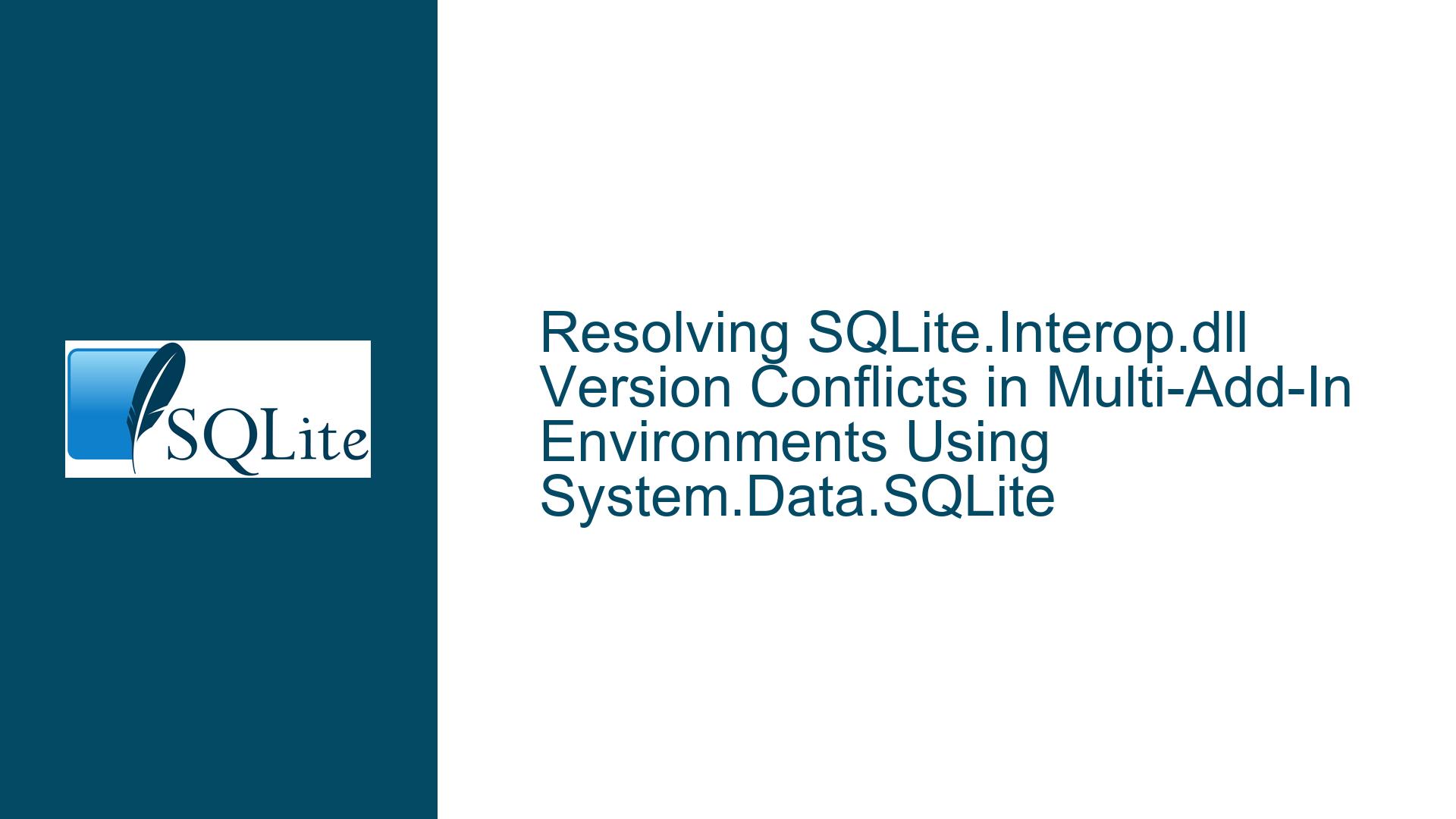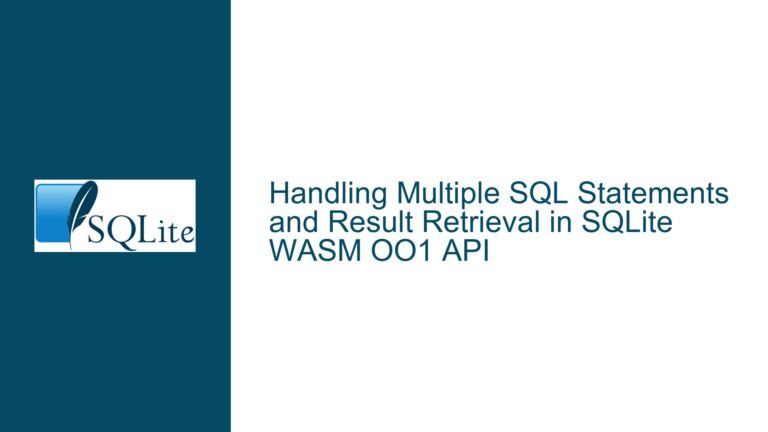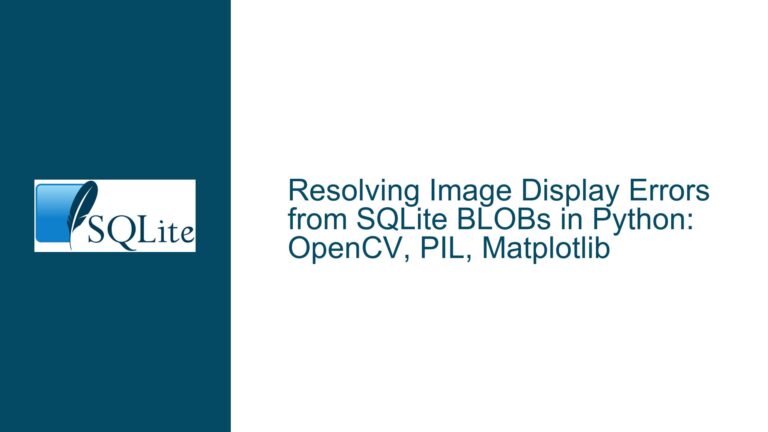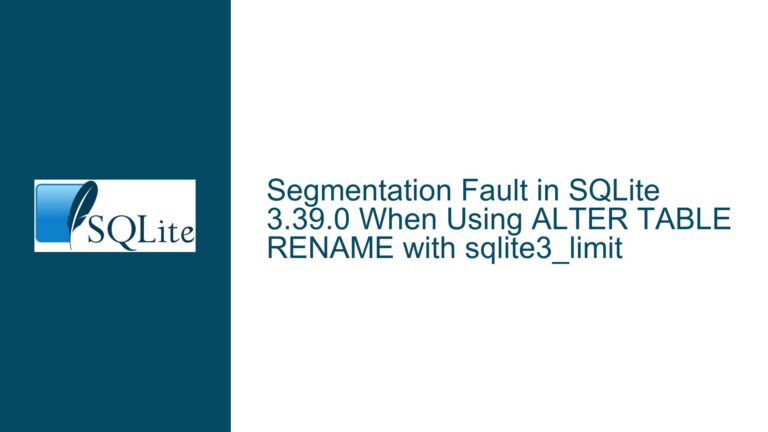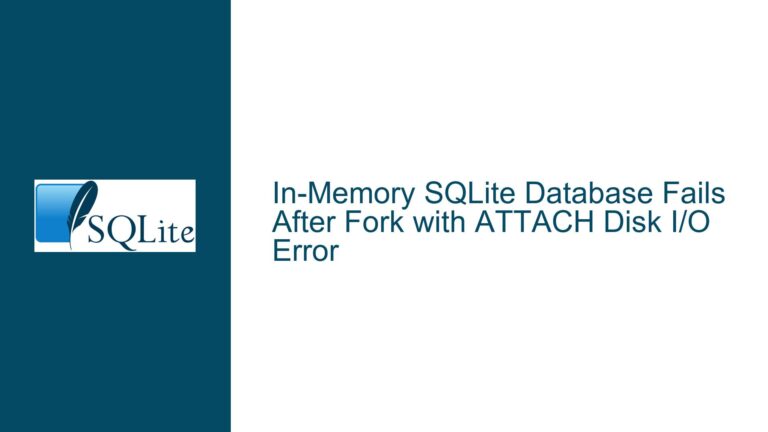Resolving SQLite.Interop.dll Version Conflicts in Multi-Add-In Environments Using System.Data.SQLite
Managing SQLite.Interop.dll Version Conflicts in Multi-Add-In Deployments
Issue Overview: Interop DLL Version Collisions Due to Hardcoded Filenames in System.Data.SQLite
The core issue arises when multiple add-ins or applications leverage the System.Data.SQLite library within the same execution environment. Each add-in may depend on a distinct version of the native SQLite.Interop.dll, which bridges managed code (e.g., C#) with the unmanaged SQLite engine. The System.Data.SQLite assembly hardcodes the filename "SQLite.Interop.dll" in its P/Invoke declarations, forcing all add-ins to compete for the same filename. This creates a versioning conflict when multiple add-ins are deployed, as the operating system or runtime environment may load the first instance of SQLite.Interop.dll it encounters, regardless of whether it matches the expected version. The result is undefined behavior, including crashes, data corruption, or cryptic errors such as "bad parameter or other API misuse."
The problem is exacerbated in environments where add-ins are installed system-wide or share common directories. For example, if Add-In A requires SQLite.Interop.dll version 1.0.0 and Add-In B uses version 2.0.0, the runtime may load version 1.0.0 for both if it resides in a directory scanned earlier in the load order. This mismatch between the managed System.Data.SQLite assembly and the native interop library leads to API incompatibilities, as newer versions of SQLite.Interop.dll may introduce functions, parameters, or memory layouts that older assemblies cannot correctly invoke.
A common workaround involves recompiling the System.Data.SQLite source code to append a version-specific suffix to the interop DLL filename (e.g., SQLite.Interop_v1.0.0.dll). However, this approach requires maintaining a custom fork of the library, which introduces maintenance overhead and risks deviations from upstream updates. Furthermore, improper compilation settings or misalignments between the managed and native components can trigger runtime errors, such as the "bad parameter" exception observed when opening database connections. These errors often stem from discrepancies in structure definitions, function signatures, or memory management conventions between the custom-built assembly and the interop DLL.
Possible Causes: Hardcoded Interop DLL References and P/Invoke Layer Constraints
The root cause of the version conflict lies in the design of the System.Data.SQLite library’s P/Invoke layer, which relies on static linking to the SQLite.Interop.dll via the DllImport attribute. The DllImport attribute requires a constant string literal for the DLL filename, preventing runtime resolution of the interop library’s name. This design choice ensures simplicity and performance but sacrifices flexibility in environments requiring side-by-side versioning. Consequently, any attempt to rename the interop DLL or load it dynamically without modifying the System.Data.SQLite source code is inherently unsupported.
The PreLoadSQLite_LibraryFileNameOnly configuration setting, often misunderstood as a potential solution, is not intended to override the interop DLL’s filename. Instead, it specifies a directory path where the runtime should search for SQLite.Interop.dll, bypassing the default probing logic. For example, setting PreLoadSQLite_LibraryFileNameOnly to "C:\Libraries" instructs the assembly to look for "C:\Libraries\SQLite.Interop.dll." This does not address scenarios where multiple renamed interop DLLs must coexist, as the filename itself remains immutable within the assembly’s metadata.
Another contributing factor is the lack of assembly isolation in certain deployment models. When add-ins are hosted within the same application domain (e.g., plugins for a monolithic host application), the runtime shares loaded libraries across all components. Without mechanisms like AssemblyLoadContext in .NET Core or dedicated AppDomains in .NET Framework, there is no way to enforce separation between interop DLL versions. This forces all add-ins to use the same SQLite.Interop.dll instance, even if their respective System.Data.SQLite assemblies are versioned independently.
Custom compilation of System.Data.SQLite introduces additional risks. The build process requires precise coordination between the managed assembly and the native interop project. For instance, altering the interop DLL’s filename in the managed code without updating the native project’s output name results in a mismatch, causing the DllImport declarations to reference a nonexistent file. Similarly, compiler flags that affect structure padding, calling conventions, or integer sizes must be consistent across both components to prevent memory access violations or parameter marshaling errors. The "bad parameter" error described often stems from such inconsistencies, where the managed code passes arguments that the native DLL interprets incorrectly due to divergent build settings.
Troubleshooting Steps: Custom Compilation, Deployment Strategies, and Runtime Configuration
Step 1: Validating Custom Builds of System.Data.SQLite
If maintaining a custom fork of System.Data.SQLite is unavoidable, ensure the build process aligns the managed and native components. Begin by cloning the official SQLite source repository and modifying the interop DLL’s filename in both the MSBuild projects and source code. Search for all occurrences of "SQLite.Interop.dll" in the native project’s property sheets and the managed code’s DllImport statements. Update these references to include a version suffix (e.g., "SQLite.Interop_1.0.0.dll"). Rebuild the solution in Release mode, targeting the same platform (x86/x64/ARM64) as your add-in. Verify that the output directories contain the renamed interop DLL and that the managed assembly references it correctly using a tool like ILSpy to inspect the DllImport attributes.
After compilation, test the custom assembly in a clean environment devoid of other SQLite.Interop.dll instances. Use Process Monitor (ProcMon) to trace file system activity during database operations, confirming that the runtime loads the renamed interop DLL from the expected location. If the "bad parameter" error persists, enable SQLite’s debugging features by setting the SQLITE_DEBUG or SQLITE_TRACE environment variables. Review the debug output for discrepancies in function calls or memory allocations, which may indicate mismatches in structure definitions or API versions.
Step 2: Isolating Interop DLLs Using Directory-Based Probing
To avoid recompilation, leverage the runtime’s DLL probing logic to isolate each add-in’s interop DLL. Place each version of SQLite.Interop.dll in a dedicated subdirectory relative to the add-in’s assembly. For example, structure your deployment as follows:
- AddInA\AddInA.dll
- AddInA\Native\SQLite.Interop.dll (v1.0.0)
- AddInB\AddInB.dll
- AddInB\Native\SQLite.Interop.dll (v2.0.0)
In each add-in’s initialization code, set the PreLoadSQLite_LibraryFileNameOnly property to the absolute path of its respective Native directory. This directs System.Data.SQLite to prioritize the specified directory when resolving the interop DLL, effectively isolating it from other versions. Note that this approach requires careful management of file paths, especially in portable or xcopy deployments where absolute paths may vary. Use Assembly.GetExecutingAssembly().Location to dynamically resolve the add-in’s installation directory and construct the path to the Native folder at runtime.
Step 3: Implementing Assembly Versioning and Binding Redirects
For .NET Framework hosts, employ assembly binding redirects to enforce version consistency across add-ins. If all add-ins can standardize on a single version of System.Data.SQLite, update each project’s app.config or web.config to redirect legacy assembly versions to the chosen one. This does not resolve interop DLL conflicts but ensures that the managed components align with a unified interop version. Combine this with the directory-based probing strategy to create a harmonized environment. However, this approach is impractical in decentralized ecosystems where add-ins are developed independently.
Step 4: Adopting .NET Core’s AssemblyLoadContext for Advanced Isolation
In .NET Core 3.0 or later, leverage the AssemblyLoadContext API to load each add-in and its dependencies into a separate context. This allows multiple versions of System.Data.SQLite and their corresponding interop DLLs to coexist within the same process. Create a custom AssemblyLoadContext for each add-in, overriding the LoadUnmanagedDll method to resolve the interop DLL from the add-in’s private directory. This method bypasses the global load context, ensuring that each add-in’s DllImport declarations bind to its own SQLite.Interop.dll instance. Note that this requires modifying the host application to manage add-in lifetimes and contexts explicitly, which may not be feasible in legacy or third-party-hosted scenarios.
Step 5: Migrating to SQLitePCL.raw for Dynamic Interop Resolution
Consider replacing System.Data.SQLite with SQLitePCL.raw, a newer P/Invoke layer that supports dynamic resolution of the native SQLite library. SQLitePCL.raw uses runtime delegates instead of static DllImport declarations, enabling scenarios where the interop DLL’s filename or location is determined at runtime. Configure SQLitePCL.raw to load a version-specific interop DLL from a designated path during add-in initialization. This eliminates filename conflicts without recompilation, though it necessitates rewriting data access code to use SQLitePCL.raw’s API surface. The trade-off is increased flexibility at the cost of migrating away from the familiar System.Data.SQLite abstractions.
Step 6: Auditing for API Misuse and Memory Management Errors
When encountering "bad parameter or other API misuse" errors after custom compilation, conduct a thorough audit of the SQLite function calls and memory management practices. Use the SQLITE_USE_LEGACY_STRUCTS compiler flag to ensure structure compatibility with older versions of System.Data.SQLite. Enable full exception debugging in Visual Studio to capture the exact stack trace and parameters leading to the error. Cross-reference these parameters with the SQLite documentation to identify mismatches, such as passing a closed database handle or incorrect pointer arithmetic in blob operations. Additionally, validate that all disposed objects are properly nullified and that transactions are correctly scoped to prevent dangling connections from interfering with subsequent operations.
Step 7: Evaluating Alternative Deployment Models
If none of the above strategies are viable, explore alternative deployment models that avoid interop DLL collisions. Package each add-in as a self-contained executable with its own copy of System.Data.SQLite and the interop DLL. Communicate between add-ins via inter-process communication (IPC) mechanisms like named pipes or HTTP APIs. While this introduces overhead, it guarantees complete isolation of SQLite components. Alternatively, consolidate all add-ins to use a shared SQLite instance managed by a central service, though this complicates version upgrades and dependency management.
By systematically addressing the interplay between hardcoded filenames, P/Invoke constraints, and deployment isolation, developers can mitigate SQLite.Interop.dll conflicts while balancing maintenance overhead and compatibility requirements.
